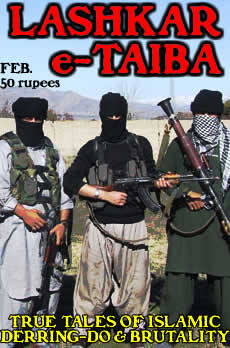 [DAWN] The Foreign Office on Thursday termed the United States' decision to designate three Pakistain-based organizations as terror groups a 'unilateral move' that does not apply to Pakistain.
[DAWN] The Foreign Office on Thursday termed the United States' decision to designate three Pakistain-based organizations as terror groups a 'unilateral move' that does not apply to Pakistain."There is a procedure at the United Nations
...an idea whose time has gone...
to declare any person or organization a terrorist; however, the US' decision to declare three Pak-based organizations [as terror groups] does not apply to Pakistain," Foreign Office spokesperson Tasneem Aslam told news hounds at the weekly media briefing in Islamabad.
On Wednesday, the US Treasury Department slapped sanctions on two Pakistain-based terrorist organizations -- LeT and Harakat ul-Mujahidin (HuM) -- and froze the assets of their leaders.
The announcement claimed that the assets were used for providing financial support to LeT, which is accused of carrying out the Mumbai terror attacks.
The Treasury notification described HuM as "a terrorist group that operates throughout India, Pakistain, and Afghanistan, and maintains terrorist training camps in eastern Afghanistan."
Both organizations are proxies for the Pak govt...
According to the notification, in 2005, HuM attacks in Kashmire killed at least 15 people, and in 2007, an unspecified number of Indian troops were also killed in a firefight with HuM Lions of Islam in the area.
The Pak govt of course plausibly denies all connection. They probably suggest that the attacks were "false flag" attacks organized by RAW. That's what they usually do.
To date, the Treasury Department has designated 27 individuals and three entities associated with LeT.
"Tut tut! Not nearly enough evidence to implicate Lashkar-e-Taiba in the Mumbai attacks, much less the Pak govt. All 27 have alibis for the times in question, and the Pak govt wasn't even in the country at the time! Besides, all the witnesses are dead!"
Sanctions
Placing sanctions on Harkut-ul-Mujahideen leader Fazl-ur Rehman Khalil,
One of the original signers of Osama bin Laden's declaration of war against humanity.
the US treasury said in a statement, "HuM is a terrorist group that operates throughout India, Pakistain and Afghanistan, and maintains terrorist training camps in eastern Afghanistan."
...which for some reason no one seems able to blow away...
In addition, the treasury department also named Muhammad Naeem Sheikh and Umair Naeem, whose Lahore-based businesses Abdul Hameed Shahab-ud-Din (AHSD) and Nia International were designated for providing financial support to LeT.
"Tut tut, my good man! Perfectly legit businesses, we assure you! Dealers in fine shoes, fine shoes! For ladies, too! Made from hides provided by holy day sacrifices, so good for your spiritual development even whilst walking!"
In the India-US joint statement released after the Obama-Modi meeting, the two sides said, "The leaders stressed the need for joint and concerted efforts, including the dismantling of safe havens for terrorist and criminal networks, to disrupt all financial and tactical support for networks such as al-Qaeda, Lashkar-e-Taiba
...the
Army of the Pure,an Ahl-e-Hadith terror organization founded by Hafiz Saeed. LeT masquerades behind the Jamaat-ud-Dawa facade within Pakistain and periodically blows things up and kills people in India. Despite the fact that it is
banned, always an interesting concept in Pakistain, the organization remains an blatant tool and perhaps an arm of the ISI...
, Jaish-e-Mohammad
...literally
Army of Mohammad, a Pak-based Deobandi terror group founded by Maulana Masood Azhar in 2000, after he split with the Harkat-ul-Mujaheddin. In 2002 the government of Pervez Musharraf
bannedthe group, which changed its name to Khaddam ul-Islam and continued doing what it had been doing before without missing a beat...
, the D-Company
That'd be Dawood Ibrahim, the local Ernst Stavro Blofeld taste-alike. The Paks just can't seem to find him...
and the Haqqanis." The US actions point to a deeper cooperation against terrorism. National security adviser Ajit Doval has stayed on in the US to have further talks on fighting terrorism.
"Shoes! Shoes! Who will buy my pretty shoes?"
"Both LeT and HuM are violent terrorist organizations that train Lions of Islam and support the activities of many of the best known and brutal turban groups, including Al Qaeda," said US under secretary for terrorism and financial intelligence David S Cohen.
"Today's designations will disrupt efforts by these terrorist organizations to access their financial networks and the international financial system," he said.
